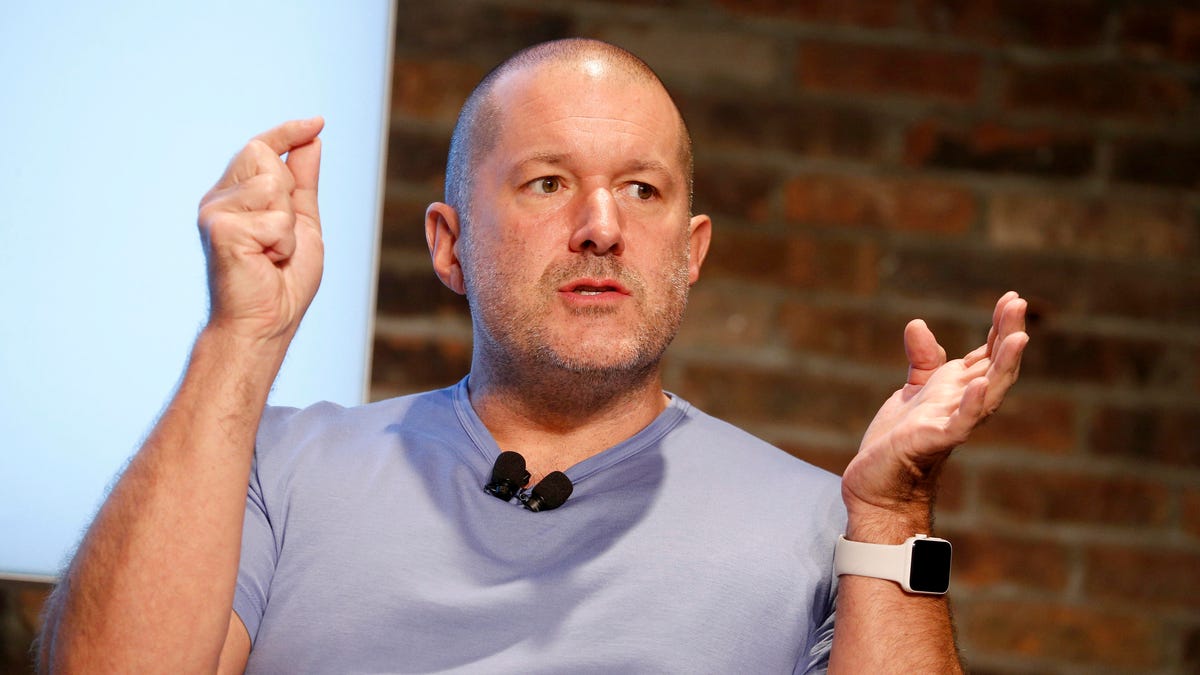Jony Ive on Jobs, creativity and why old cellphones sucked
In a rare public interview, Apple's design chief shares that he never met anyone who could focus like Steve Jobs.

Jony Ive at the 2017 New Yorker TechFest in New York City.
A central, driving force for Jony Ive and Apple's team to create the iPhone was the pedestrian lousiness of cellphones 10 years ago.
"When we worked on the iPhone, certainly a significant part of our motivation was the loathing we had for the phones that we were using," Ive, Apple's chief design officer, said during a rare public interview at The New Yorker TechFest conference Friday in Manhattan.
"Why?" David Remnick, the magazine's editor, asked him onstage. "Because they felt horrible in the hand, they didn't work, they looked like crap? What was it?"
"I think all of that," he responded in his iconic, smooth British accent, made famous by his narrations of Apple sizzle reel videos, as the audience laughed. "They were poorly made ... to me they testified to convenience and a lack of ambition. I just find it hard not to take affront to that. I think we're important and we deserve at least a sincere effort."
Ive helped design some of Apple's best-known products including the iPod , iPhone and iPad , all devices that helped Apple drag itself from the verge of bankruptcy to becoming the highest-valued publicly traded company in the world. He spoke for half an hour one-on-one with Remnick, offering details about his work with Apple co-founder and former CEO Steve Jobs , what it's like to form new ideas and the impact the iPhone has had on people's lives.
A big takeaway from his talk, though, was Ive's repeated reference to pursuing higher standards, a hallmark of both Apple's and Ive's reputations.
"If I get to sit down for two hours with one of the world's best silicon chip designers, I could not be happier," said Ive, wearing an Apple Watch with a white band on his left wrist, a light blue t-shirt, moccasin-style shoes and slacks. "And what connects us is a curiosity and also that sort of sense of that authentic pursuit of excellence. We may not get there, we often don't, but that sense of really wanting to do something, make something very well."
Here are a few more excerpts from the interview:
On working with Jobs
"I've never quite had this experience before and I've not had it since, but we on the first meeting, in a quite shocking way, really did click," Ive said. "We just established an immediate understanding."
The two became close friends, having lunch together every day and working together pretty much daily, too. At the same time, Jobs early on told Ive that "as the head of design I've been, ultimately, completely ineffective," since Apple at the time was shipping subpar products.
"Were you offended, were you upset?" Remnick aked.
Ive responded that the situation at Apple was far worse than Jobs' critique. "I was very invested in this company and it broke my heart watching it drift into irrelevance," he said.
On the creative process
"There's something about the creative process that I still find remarkable," Ive said. "That on a Tuesday, there's not an idea, it's just Tuesday. And on Wednesday, there's an idea. And it invariably starts as a very tentative and fragile thought and ... it's so nebulous that the ability to try and describe it and communicate it is very important to that idea. … And I still love how you can have a thought that is so fragile that can become something so powerful. I feel so grateful that I can participate in this process."
On focus
"I had the most wonderful teacher in Steve," Ive said. "I never met anybody with his focus. … The art of focus, even if it's something you care passionately about, it means putting it aside and often it's a real cost. And he was remarkable at that. And there have been a few periods where I've felt I've achieved that focus, and it's a little eery. You do have a sense, boundaries before, impediments before that seemed insurmountable seem trivial and it takes so much effort and is exhausting to sustain. And all of the things we've done have required that focus."
On misuse of the iPhone
Ive said he feels "a joy" when his products connect people, but added that, like any tool, these gadgets can be misused, too. Pressed by Remnick on what a potential misuse would be, he said: "I think perhaps constant use. ...This isn't a new phenomenon that we have to exercise a modicum of self-control to find the right balance."
On Apple's culture
"I think," Ive said, "we're a bunch of very anxious, worrying individuals who generally assume it's not going to work unless we prove it otherwise."
Originally published on Oct. 6 at 11:48 a.m. PT.
Update, 12:42 p.m. PT: Added additional quotes and context.
Does the Mac still matter? Apple execs explain why the MacBook Pro was over four years in the making, and why we should care.
The Smartest Stuff: Innovators are thinking up new ways to make you, and the things around you, smarter.

